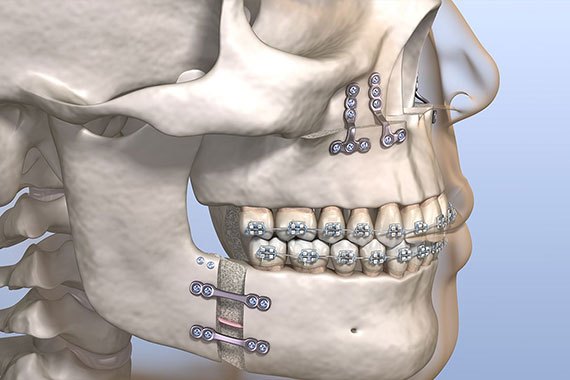
MAXILLOFACIAL SURGERY
Oral and maxillofacial surgery is a surgical speciality focusing on reconstructive surgery of face, facial trauma surgery, the oral cavity, head and neck, mouth and jaws, as well as facial cosmetic surgery and tooth extraction.
TOOTH EXTRACTION
A dental extraction or exodontia is the removal of the teeth from the socket. Extractions could be categorized into NON SURGICAL (SIMPLE) and SURGICAL, depending on the type of tooth to be removed and other factors.
WHEN TOOTH EXTRACTION IS REQUIRED?
A decayed tooth can usually be repaired with a filling, a crown or another form of treatment. In cases when it cannot be repaired, the tooth needs to be removed. Reasons for extractions are:-
- Severe tooth decay or infection
- Loose tooth structure due to severe gum disease
- Impacted wisdom teeth
- Supernumerary tooth or extra tooth that is blocking other teeth from coming in.
- Fractured tooth
- Tooth that cannot be treated by root canal treatment.
- For braces treatment where space is required in crowded teeth.
WHAT IS THE DIFFERENCE BETWEEN A SURGICAL TOOTH EXTRACTION AND A TOOTH EXTRACTION?
A surgical tooth extraction is required when there can be some complications such as extensive decay causing the tooth breaking off at the gum line. Other situation can be caused by curved roots. Sometimes third molar or wisdom tooth extraction go for surgery because of its position horizontally or angled and surrounding area i.e. pus and swelling.
WHAT ARE THE POST EXTRACTION INSTRUCTIONS?
Do's:
- Do keep relatively quiet and rest on the day of your tooth extraction.
- Do keep gauze pack in place for 30-45 minutes after surgery, then remove
- Use ice packs immediately after surgery and for the next 24 hours to reduce swelling. Apply ice packs for 20 minutes on and 20 minutes off.
- Be on cold and soft diet for next 24 hours.
Don’ts
- Do not spit, rinse or smoke for 24 hours. It dislodges the blood clots forming in the sockets.
- Do not drink through straws. Drink directly from the glass or use a spoon for ice-cream.
- Do not take alcoholic beverages while taking prescribed antibiotics or pain killers. Also no medication should be taken on empty stomach except antacids(medicines for gas and acidity)
WHAT YOU CAN EXPERIENCE AND WHAT TO DO?
- Bleeding may continue for a short period of time or may persist until the next day. Maintain gentle pressure by biting on the gauze packs until it stops. Do not chew on the gauze. If bleeding starts again, put clean gauze over the bleeding area and bite on it with firm, steady pressure for one hour and use ice packs over the cheeks. If profuse bleeding or any other problems occur please call us.
- Some degree of swelling and discomfort following the surgery is to be expected. Discolouration and a slight stiffness of the jaw can be normal post operative events. Do not be alarmed. Maximum swelling is expected on a second day and may last for several days. A sore throat or tender nose may also occur.
- Do not brush your teeth or rinse your mouth until the morning following the surgery.
- If prescribed, take pain killers and antibiotics as directed. It is important to take the prescribed antibiotics even if there is no pain or swelling.
- Most of the times the sutures or stitches used dissolve themselves and small pieces will come out approximately 4-6 days following the surgery. This is to be expected. If the sutures need to be removed, an appointment will be made for you.
- Good dental hygiene is important and should be started the day after surgery. Brush your teeth well and begin rinsing with lukewarm water added with one pinch of salt 3-4 times daily especially after eating.
